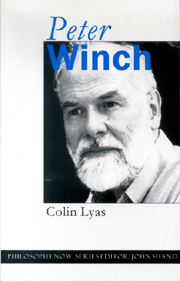Book contents
- Frontmatter
- Contents
- Preface
- Introduction: Peter Winch, a glimpse of a life
- 1 “Such understanding as I have”: The influence of Wittgenstein
- 2 “I was investigating the notion of the social”: The idea of a social science
- 3 “Seriously to study another way of life”: Understanding another society
- 4 “Good examples are indispensable”: The ethical life
- 5 “The concept of God is used”: The religious forms of life
- 6 “The interval of hesitation”: Peter Winch's Simone Weil
- 7 “Someone willing to die for truth”: Peter Winch's legacy
- Envoi
- References
- Index
Introduction: Peter Winch, a glimpse of a life
- Frontmatter
- Contents
- Preface
- Introduction: Peter Winch, a glimpse of a life
- 1 “Such understanding as I have”: The influence of Wittgenstein
- 2 “I was investigating the notion of the social”: The idea of a social science
- 3 “Seriously to study another way of life”: Understanding another society
- 4 “Good examples are indispensable”: The ethical life
- 5 “The concept of God is used”: The religious forms of life
- 6 “The interval of hesitation”: Peter Winch's Simone Weil
- 7 “Someone willing to die for truth”: Peter Winch's legacy
- Envoi
- References
- Index
Summary
This is not a biography of Peter Winch. In particular it does not discuss Winch's private life, intrusions into which he resisted. It is no more than an attempt to give my reader some sense of a rather special human being.
Peter Winch was born in London in 1926. Towards the end of the Second World War he served on a naval destroyer. In this there is a peculiar connection with Norman Malcolm, who was later to become his close friend, and with whom he shared the inheritance of Wittgenstein's manner of philosophizing. Malcolm, too, served on destroyers, his comments on the boredom of war in the navy drawing a typical rejoinder from Wittgenstein, whose own record in the First World War was quite extraordinary (Malcolm 1958; Monk 1990: Ch. 6). Winch served as sonar operator and perfected his German during shore patrols in various German ports in the immediate aftermath of the war. It is reported that his interest in philosophy was aroused by conversations with an officer on his destroyer, but I am unable to identify that officer. Whoever he was, his influence set Winch on a distinguished career. After the war he completed his BA at Oxford University and followed this with a BPhil, during the course of studies for which he was influenced by Ryle; an influence that is clearly perceivable in an early paper (Winch 1953).
- Type
- Chapter
- Information
- Peter Winch , pp. 1 - 8Publisher: Acumen PublishingPrint publication year: 1999



